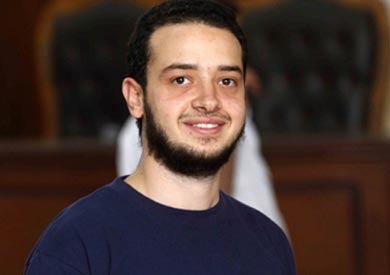Anas al-Beltagy, who has been denied any contact with his family for six years, continues to be barred from prison visits, following his transfer from the Badr 1 Prison to the 10th of Ramadan prison in Sharqia governorate on June 8.
He has been arbitrarily detained for over nine years, despite being acquitted by courts in four separate trials. Concerns over his health mounted after he appeared weak during a detention renewal hearing held via videoconference on 17 July.
He must be immediately and unconditionally released as his detention is solely due to his family links.
Here’s what you can do:
Write to:
President Abdelfattah al-Sisi
Office of the President
Al Ittihadia Palace
Cairo, Arab Republic of Egypt
Email: p.spokesman@op.gov.eg
Twitter: @AlsisiOfficial
Salutation: Your Excellency:
And copy:
His Excellency Ahmed Abdallah Ibrahim HAFEZ
Ambassador
Embassy of the Arab Republic of Egypt
454 Laurier Avenue East
Ottawa, ON K1N 6R3
Email: embassy.Ottawa1@mfa.gov.eg
Tel: (613) 234-4931, 4935 Fax: (613) 234-9347/234-4398
Background
Security forces first arrested 20-year-old Anas al-Beltagy on December 24, 2013 during a visit with his mother to the Tora Prison Complex to see his detained father, Mohamed al-Beltagy. According to information gathered by Amnesty International, security forces surrounded and beat them, before transferring them to the Maadi prosecution where they were interrogated over accusations of assaulting prison guards. The prosecution ordered their provisional release on bail after about twenty hours of detention.
On December 31, 2013, Anas al-Beltagy was arrested at a friend’s house in Nasr City neighborhood of Cairo. He was taken to Nasr City 1 Police Station, where police officers refused to acknowledge his detention and forcibly disappeared him for nearly a month, during which he was subjected to torture and other ill-treatment. Amnesty International learned from informed sources that security forces held him in a small iron cage, described as “unfit for humans”.
After his transfer to Abu Zaabal prison in Alexandria in early 2014, the prison administration held him in prolonged solitary confinement and forced him to sleep on the bare concrete floor. He was subsequently transferred to the Tora Prison Complex, south of Cairo, where he continued to be subjected to torture and other ill-treatment, including prolonged solitary confinement. He was transferred to the Badr Prison Complex in November 2022.
Torture & Other Ill-treatment
He was held in Badr Prison 1 from November 2022 to June 08, 2023 when he was transferred to 10th of Ramadan prison. In Badr 1, he was held in cruel and inhuman conditions of detention. For months, he was held in solitary confinement in a freezing cell with fluorescent lights switched on 24 hours a day, not permitted any exercise outdoors and denied any contact with other prisoners.
In 10th of Ramadan prison, prison officials continue to ban his family from bringing him any food, climate-appropriate clothes, and medicine, despite well-documented patterns of prison authorities failing to provide those in their custody with sufficient food, potable water, basic items for personal hygiene, adequate clothing and bedding.
During his detention renewal hearings, which have been held remotely via video link since 2022, and in which he sometimes appears with his hands and legs cuffed, he complained about the deterioration of his physical and mental health and psychological condition due to his detention conditions. During online hearings, defense lawyers are present in the courtroom with the judges, while the defendant is connected from a room in the prison.
Unfair trials
Such hearings erode fair trial standards and take place under coercive circumstances in the presence of prison guards and detainees are prevented from communicating privately with their lawyers. Further, they expose detainees to risks of reprisals from guards for complaining about torture or other ill-treatment and impede the ability of judges to spot visible bruises or other injuries. Lawyers also frequently complain of technical problems during online hearings, including poor connectivity and their inability to adequately hear defendants.
Security forces have long targeted the family of Mohamed al-Beltagy, leading several to flee Egypt. Security forces killed Asma al-Beltagy, Anas al-Beltagy’s sister, aged 16 at the time of her death, during their violent dispersal of the Rabaa al-Adawiya sit-in on August 14, 2013, which left some 900 dead. No security or military official has been held accountable to date, while authorities rounded up thousands of actual or suspected members and supporters of the Muslim Brotherhood.




























